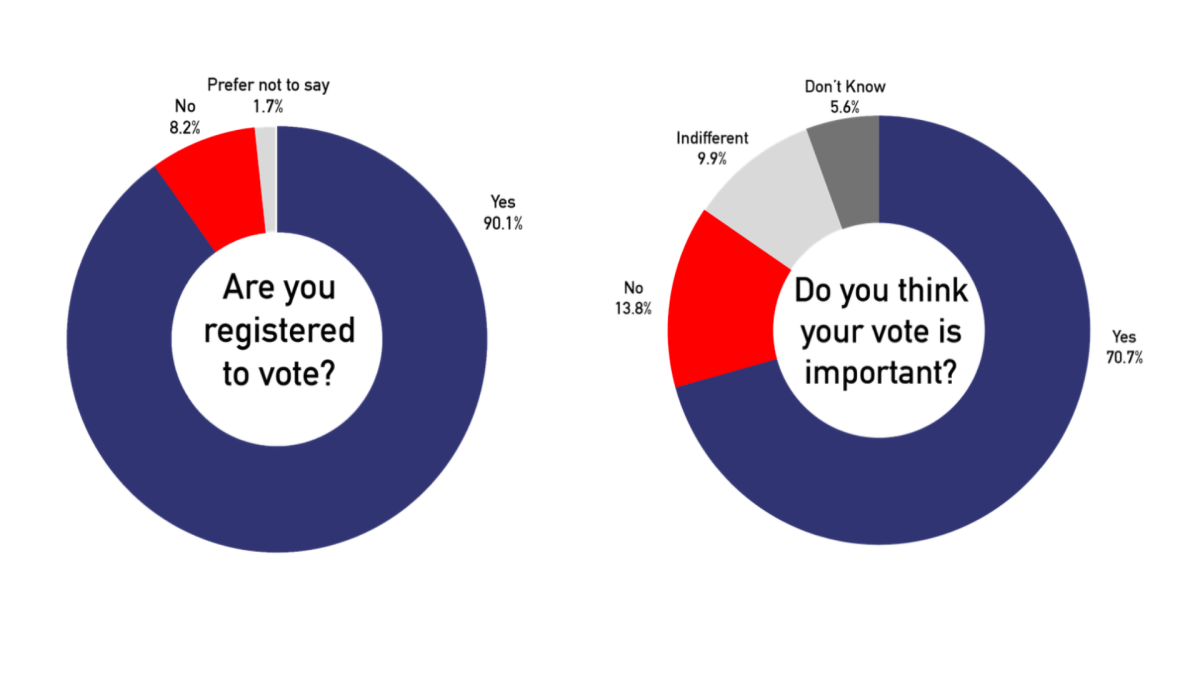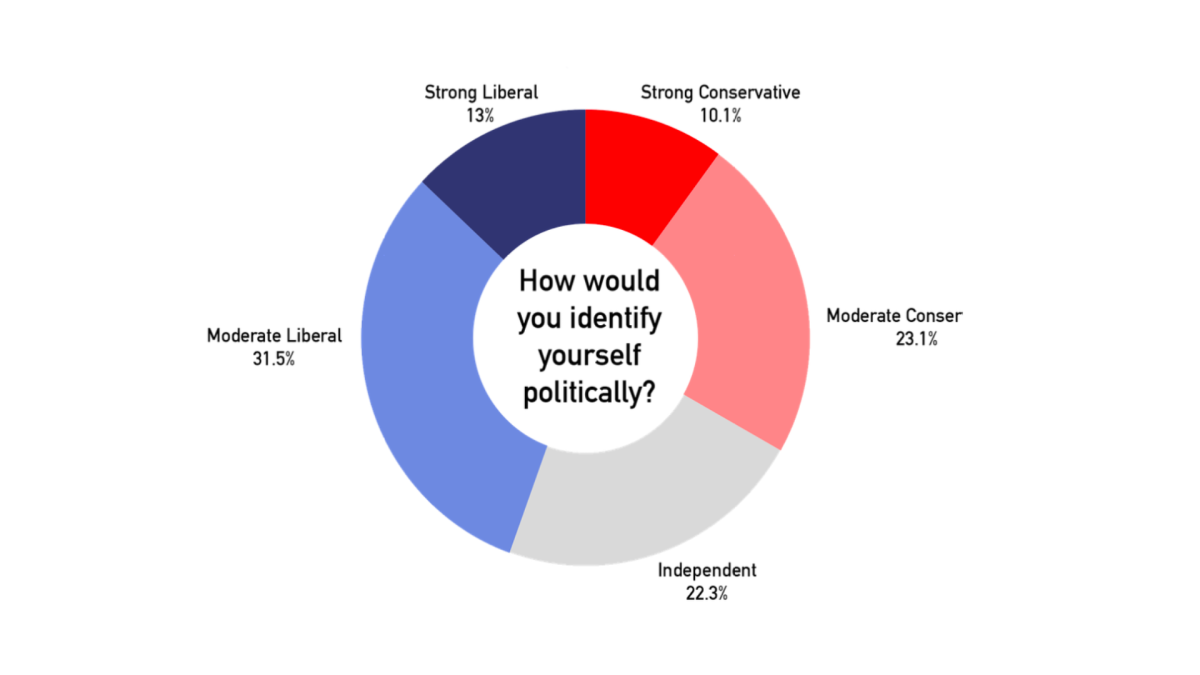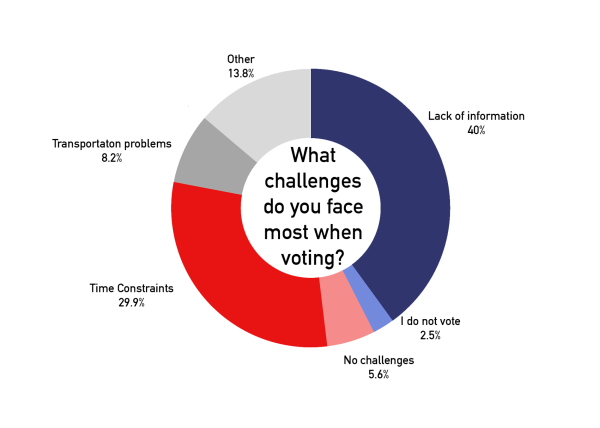Even though young voters are shaping up to be the largest voting bloc in the 2024 election, many of them still have doubts about the significance their vote may hold.
According to the Center for Information and Research on Civic Learning and Engagement, 41 million members of Generation Z are eligible to vote in the upcoming election. This leaves millennials and Gen Z as nearly half of all eligible voters in November. Young voters on WKU’s campus are reflecting doubts over the significance of their vote. The Herald found, through an informal survey and in discussions with Hilltoppers, that some students have mixed feelings about how important their vote really will be in the upcoming election.
From Sept. 17 to Sept. 22, the Herald conducted an informal survey of WKU students to gauge voting behavior. The survey was sent to Hilltoppers through a list the Herald compiled of current WKU students, through Herald social media and the use of the university’s faculty-all and staff-all email lists. The Herald requested professors and instructors to share the survey with their classes. Across five days, 355 WKU students participated in the survey.
Of the 355 respondents, 320 said they are registered to vote. Only 251 respondents, however, said they think their vote is important.

Arianna Pierson, a senior criminology and sociology major, said the Electoral College plays a role in how students view their vote. This system, she said, inherently makes an individual’s vote seem unimportant to some.
“They think that if they vote, in the end, it just won’t matter,” Pierson said.
Scott Lasley, chair of the WKU political science department, emphasized, however, votes can have a greater impact on issues when taken as part of a group.
“Let’s say young people voted at a higher rate than all other groups,” Lasley said. “They’re going to carry more weight on issues that are important to them.”
But this is dependent on the decision to cast a vote in the first place.
In addition to the Electoral College, Pierson also noted young voters feel that the two-party system does not allow enough choice, and should they choose to vote for a third-party candidate, that vote would not matter. “Even though there’s other parties, everybody’s always like, ‘Oh, I’m either a Conservative or a Liberal,’ and there’s no in-between,” Pierson said. “There’s no ands, ifs or buts. So they always feel like, ‘Even if I’m [a] Green Party, even if I’m a moderate, even if I’m a Libertarian, it doesn’t matter because my vote is going to be split in two.’”

Pierson also reflected the sentiment that individuals she has interacted with feel that issues do not currently affect them, so young people do not feel an urgency to vote.
“I also think that a lot of people in America tend to be apolitical, especially if they’re not people of color, because genuinely, they’re like, ‘Oh, it doesn’t affect me, so I don’t have to have an opinion about it,’” Pierson said.
Lasley addressed the legitimacy of these concerns while also acknowledging that one vote can impact the results.
“If they’re [students] talking from a strict, technical sense, the odds of their vote changing the outcome of an election is not likely,” Lasley said. “But in a very close election, one or a handful of votes can certainly swing the results.”
While a single voter may not have a strong voice on their own, Lasley said, the accumulation of individual voices “have a greater impact.”
The Herald’s survey found that 40% of respondents also cited a lack of knowledge as a primary factor in what challenges them the most in voting. Several student organizations are working to promote civic engagement and literacy across campus to combat this lack of knowledge.
The Student Government Association, while being an apolitical organization, strives to promote engagement in November’s election from Hilltoppers.
“The election is right around the corner,” Student Body President Sam Kurtz said at the Sept. 10 SGA meeting. “We believe that students should express their voices and opinions through democratic measure. There’s nothing more democratic than voting.”
Partisan student groups on campus are also promoting student engagement and encouraging Hilltoppers to vote.
“Voting is the foundation of democracy,” Christian Sander, chairman of the WKU College Republicans and a senior digital analytics major, said.
“It’s very important that young people vote and build a future that they want to live in. That really goes for anyone – young or old.”
Sander disagreed with the general stigma that political division prevents people from voting.
“I think that there’s a rise in political controversy, I think that got people more interested in politics,” Sander said. “The lack of knowledge of political candidates and what they stand for is a contributing factor.”
Sander said many people are often distracted by the federal government, and said they should care just as much about local elections.
“A mayor or state senator has a lot more impact on your daily life than a president does in many ways,” Sander said.
Jakob Barker, president of the WKU College Democrats and a freshman international affairs and economics major, echoed this, emphasizing that voting in local elections matters a lot more than in national elections.
He said local elections directly affect community issues but are often overlooked by students.
“Despite what’s happening on a national scale, your vote does matter on a local level,” Barker said.
Barker said a lot of people, at least in WKU’s College Democrats organization, know more about national candidates than local candidates. Since Bowling Green is politically diverse, Barker said that makes it even more important to vote on a local level since those candidates’ decisions will impact the community on a daily basis.
Barker said while the Electoral College does “strip a lot of the individual voting weight of an election” on a national scale, voting on a local level still gives students the power to make a direct impact within the city and university.
“I think as long as students know that their vote matters and that regardless of what they think on the national level, as long as they’re fighting for what matters in their communities, that’s what’s important,” Barker said. “I think voting is the best way to do that, and it’s an easy way to do that. Yeah, it might take time out of your day, but there’s no classes that day for a reason.”
In preparing to cast a vote, Lasley said registration and preparation are key.
“Thinking about it [voting] and getting it done are two different things,” Lasley said.
According to the Berkeley Institute for Young Americans, “Despite increases in voter registration across generational cohorts in recent years, younger generations of voters exhibit significantly lower rates of registration.”
The Berkeley Institute said Gen Z had the lowest rates of voter registration for any generational cohort in 2016 and 2020.
According to the Herald’s survey, 40% of participants said that lack of information was the main challenge student voters faced, while 30% pointed toward time constraints as the main obstacle. Additionally, 53% of participants said they felt somewhat informed about the candidates and issues on the ballot while 39% said they felt very informed.

Lasley said prospective voters tend to “jump to the front line” and first worry about who they are voting for, when instead, they should create a plan for the whole process.
“We forget about the details,” Lasley said. “Before you get to that point, you got to make sure you’re able to vote – which is registration. Then you got to figure out how you’re going to vote – the process – and then you worry about who you’re going to vote for. So make a plan.”
There are several ways to vote in the upcoming election. According to Warren County voting procedures, mail-in absentee paper ballots, in-person excused absentee voting, early in-person voting and in-person voting on Election Day are available for registered voters to cast their votes.
Despite a belief by many Hilltoppers that their vote is insignificant, campus leaders encourage students to vote in local elections that impact Bowling Green. They emphasize that since local elections more directly impact the daily lives of students, casting a vote is imperative.
More content from the October newsmagazine can be found here.
News Reporter Larkin Ivory can be reached at larkin.ivory045@topper.wku.edu.
News Reporter Cameron Shaw can be reached at cameron.shaw555@topper.wku.edu.
News Reporter Libby Simpson can be reached at elizabeth.simpson736@topper.wku.edu.
News Reporter Abigail Vickers can be reached at abigail.vickers153@topper.wku.edu.






